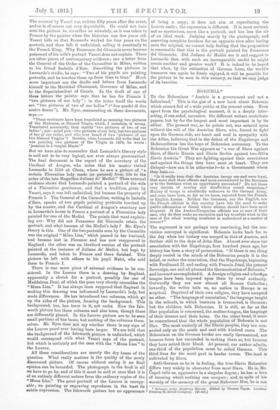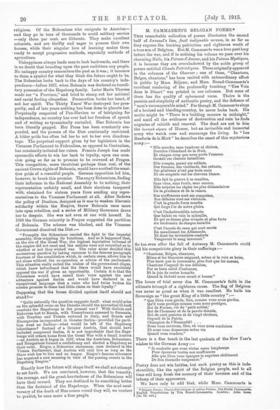BOHEMIL*
To the Bohemians " Austria is a government and not a fatherland." This is the gist of a new book about Bohemia which cannot fail of a wide public at the present crisis. Even apart from the psychological moment, it is a deeply inter- esting, if one-sided, narrative. Six different writers contribute papers, but by far the longest and most important is by its editor. The present war, as he points out, was entered upon without the will of the Austrian Slays, who, forced to fight upon the German side, are heart and soul in sympathy with the Allies, believing that in the defeat of the Hapsburgs and Ilohenzollerns lies the hope of Bohemian autonomy. To the Bohemian the Great War appears as "a war of Slays against Slays, of Slavic Russia and Slavio Serbia against two-fifths Slavic Austria." They are fighting against their convictions and against the things they have most at heart. They are disloyal—how can it be otherwise P--to a Government whom they hate :—
"Is it really true that the Austrian troops aro and were loyal, that none shot their officers and none surrendered to the Russians or to the Serbians when an opportunity presented P Do not these very denials of mutiny and disaffection sound suspicious ? Mutiny of troops is admittedly unknown in the German Army, and none have been, so fir as we know, reported from the French or English Armies. Neither the Germans, nor the English, nor tho French officials in this country have felt the need to mako public affirmation or denial where silence should have been most eloquent. If the Austro-Hungarian officials are so sure of their case, why do they make an exception and try to refute what iu tho ease of the other warring countries is understood as a matter of course P"
The argument is not perhaps very convincing, but the con- viction conveyed is significant. Bohemia looks back far to the day when her history was merged in that of Austria, and further still to the days of John Hus. Almost ever since her association with the Hapsburgs, four hundred years ago, her history has been a story of persecution. " If there is one thing deeply rooted in the minds of the Bohemian people it is the belief, or rather the conviction, that the Hapsburgs, beginning with Ferdinand II. and ending with Francis Josef, the present Sovereign, one and all planned the Germanization of Bohemia," and have not accomplished it. A foreign religion and a foreign tongue have been imposed upon them by cruel authority.
Outwardly they are now almost all Roman Catholics ; inwardly, the writer tells us, no nation in Europe is so sceptical. Deprived of their own religion, they have accepted no other. " The language of association," the language taught in the schools, in which business is transacted, is German; but the children talk Bohemian. It is still, so far as the Slav population is concerned, the mother-tongue, the language of their dreams and their home. On the other hand, it must be remembered that the whole population of Bohemia is not Slay. The most westerly of the Slavic peoples, they arc con• nected only on the south and east with kindred races. The Bohemians on the German border are really Germanized, not because force has succeeded in making them so, but because they have mixed their blood. At present, our author admits, one-third of the population must be called German. This third lives for the most part in border towns. The land is cultivated by Slays.
Anti-German as ho is in feeling, the true Slavic Bohemian differs very widely in character from most Slave. He is, Mr. iapek tells us, aggressive in a singular degree ; he has a love of learning which nothing can conquer ; and, in spite of his worship of the memory of the great Reformer Hus, be is not
• Bohemia uuder Hapsburg Misrule. Edited by Memos 6tpek, Londont Fleming H. Revell Company. 1et net.J • religious. Of the Bohemians who emigrate to America—
and they go in tens of thousands to avoid military service —only three per cent. are illiterate. They make excellent colonists, and are thrifty and eager to possess their own houses, while their singular love of learning makes them ready to accept progressive methods, especially methods of agriculture.
Unhappiness always leads men to look backwards, and there is no doubt that brooding upon the past embitters any people. No unhappy country remembers the past as it was ; it becomes to them a symbol for what they think the future ought to be.
The Bohemian looks back to the days of his country's inde- pendence—before 1627, when Bohemia was declared an heredi- tary possession of the Hapsburg family. Later Maria Theresa made her "a Province," and tried to stamp out her national and racial feeling altogether. Persecution broke her heart, if not her spirit. The Thirty Years' War destroyed her pros- perity, and of late years nothing has been done to placate her.
Perpetually suspected of Pau-Slavism or of intriguing for independence, no country has ever had her freedom of speech and of writing so tyrannically curtailed. Slav Bohemia has been literally gagged. Her Press has been constantly sus- pended, and the powers of the Diet continually restricted. A bitter pride has often led her to act to her own disadvan- tage. The perpetual support given by her legislators in the Viennese Parliament to Federalism, as opposed to Centralism, has constantly irritated her rulers. Francis Joseph has made spasmodic efforts to win her back to loyalty, upon one occa-
sion going so far as to promise to be crowned at Prague. This recognition, more theatrical perhaps than real, of the ancient Crown rights of Bohemia, would have soothed the sensi- tive pride of a resentful people. German opposition led him, however, to break this promise. The angry Bohemians, finding their influence in the National Assembly to be nothing, their representation unfairly small, and their elections tampered
with, abstained for sixteen years from sending any repre- sentatives to the Viennese Parliament at all. After Sadowa the policy of Dualism, designed as it was to weaken Slavonic solidarity within the Empire, threw Bohemia once more into open rebellion, and a series of Military Governors drove her to despair. She was not even at one with herself. In 1908 the German minority in Prague suggested the partition of Bohemia. The scheme was blocked, and the Viennese Government dissolved the Diet
"Promptly the Bohemians carried the fight to the imperial assembly, thus crippling its functions. And so it happened that, on the eve of the Great War, the highest legislative tribunal of the empire did not meet and the nations were not consulted as to whether or not they wished war. The ruler alone decided this momentous question by taking recourse to the famous paragraph fourteen of the constitution which, in certain cases, allows him to act alone without the co-operation or advice of the parliament. This situation really suited the wishes of the government clique, which knew beforehand that the Slays would have resolutely opposed the war if given an opportunity. Certain it is that the Bohemians would have raised their voice against the mad adventure against Serbia and would have declared in no unequivocal language that a ruler who had twice broken his solemn promise to them had little claim on their loyalty."
Supposing that the house divided against itself should not stand 1)— " Quite naturally the question suggests itself : what would arise on the splendid ruins on the Danube should the proverbial ill-luck overtake the Hapsburgs in the present war P With Galicia and Bukovina lost to Russia, with Transylvania annexed to Rumania, with Trentino and Trieste restored to Italy, and Bosnia and Herzegovina incorporated in Greater Serbia—provided the parti- tion went no further—what would be left of the Hapsburg inheritance? Instead of a Greater Austria, that should have included conquered Serbia, it is not improbable that the Haps- burgs will return home from the Great War with a Small Austria —an Austria as it began in 1627, when the Austrians, Bohemians, and Hungarians formed a confederacy and elected a Hapsburg as their ruler. Riegor, a Bohemian statesman, once declared in the Vienna Parliament, that Austria will only live as long as the Slays wish her to live and no longer. Riegor's famous utterance has acquired a new moaning in view of the passing events in the Hapsburg Empire."
Exactly how the future will shape itself we shall not attempt to set forth. We are convinced, however, that the tenacity, the courage, and the great-heartedness of the Bohemians will have their reward. They are destined to be something better than the footstool of the Hapsburgs. When the next anni- versary of the death of Hus comes round they will, we venture to predict, be once more a free people.











































 Previous page
Previous page